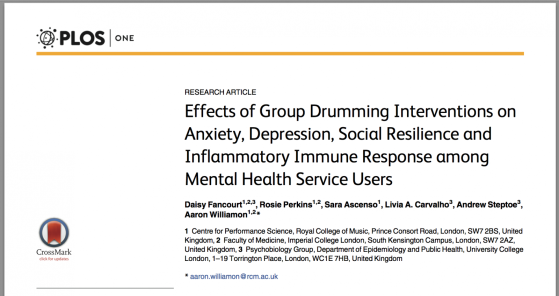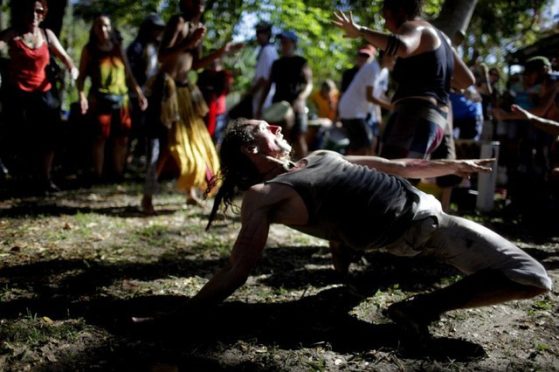Group drumming causes significant increases in well-being, including reductions in depression, anxiety, and social resilience. A study published in PLoS scientifically supports what so many drum circle members have already personally experienced.
More than ever, we need options that don’t involve drugs. According to the World Health Organization, depression is the leading cause of disability around the world, and psychiatric drugs have serious side effects, like making it impossible for the body to heal itself. Might collective drumming offer precisely such a remedy?

The study, “Effects of Group Drumming Treatments on Anxiety, Depression, Social Resilience, and Inflammatory Immune Response Among Mental Health Service Users,” was published in the journal Social Resilience. Thirty people who were already getting mental health treatments but were not using antidepressants were recruited in a 10-week drumming program by UK researchers, as opposed to a control group of fifteen. In terms of age, sex, ethnicity, and work position, the two groups were matched. The group drumming sessions were not made available to the control participants, who were only told that they were taking part in a study investigating the relationship between music and mental health. The people in the treatment group met once a week for 90 minutes to play drums as a group for ten weeks. The size of the drum groups ranged from 15 to 20. Each participant sat in a circle and received a traditional African djembe drum. While only 20% of the session was spent on education and chatting, the remaining 80% was spent directly generating music. The people in the control group took part in reading clubs, quiz nights, and Women’s Institute meetings. In order to track the physiologic as well as psychological changes brought on by the intervention, cortisol and different cytokines, which are connected to the immunological state and inflammation, were measured in both groups.
The study’s results, which were astounding, were reported as follows:
“While the control group did not experience any significant improvements, the drumming group did. By week 6, there were decreases in depression (-2.14 SE 0.50 CI -3.16 to -1.11) and increases in social resilience (7.69 SE 2.00 CI 3.60 to 11.78), and by week 10, these had further improved (depression: -3.41 SE 0.62 CI -4.68 to -2.15; social resilience: 10.59 SE 1.78 CI 6.94 to 14.24). (6.14 SE 0.92 CI 4.25 to 8.04). All notable changes persisted after three months of follow-up. In addition, it is now known that underlying inflammatory immunological responses underlie many mental health disorders. In order to test for cortisol and the cytokines interleukin (IL) 4, IL6, IL17, tumour necrosis factor alpha (TNF), and monocyte chemoattractant protein (MCP) 1, participants in the drumming group additionally submitted saliva samples. Throughout the course of the 10 weeks, the immunological profile shifted from being pro-inflammatory to being anti-inflammatory. mental health.” [emphasis added]
By week six, the drumming intervention group had less depression and more social resilience. By week ten, they had even less depression and more anxiety and mental wellness. Three months after the first alteration, these modifications were still in effect. Also, the pro-inflammatory immunological profile of the drumming intervention group changed to an anti-inflammatory response.
Compared to traditional treatment with psychiatric drugs like Prozac, this ground-breaking study suggests that group drumming may cause positive psychospiritual changes that allow for improvement without side effects in areas other than symptom suppression.
When you consider that the benefits of traditional pharmaceutical treatments for depression may be due to the placebo effect and not the chemicals themselves, and that antidepressants can cause serious side effects like suicidal thoughts, the results of this exploratory study are even more encouraging.
Another significant finding is that group drumming reduced inflammation in research participants’ immunological profiles. Could a problem with how inflammation is controlled be the cause of a number of psychiatric diseases, with anti-inflammatory drugs as a possible treatment? In her latest book, “A Mind of Your Own: The Truth About Depression and How Women Can Heal Their Bodies To Reclaim Their Lives,” which discusses the crucial physiological role of inflammation in conditions as diverse as depression, bipolar disorder, and anxiety, Dr. Kelly Brogan explores this exact thesis in depth. The relationship between inflammation and depression helps to explain why treatments like turmeric have been clinically shown to be more effective than popular antidepressants like Prozac. This is likely because turmeric has systemic and broad-spectrum anti-inflammatory capabilities.
An Ancient Healing Technique Using Drumming
In a recent article titled “6 Ways Drumming Heals The Body, Mind, And Soul,” I examined the available scientific evidence on the therapeutic benefits of drumming and looked into some of the likely evolutionary roots of this old cultural skill. The idea that even insects drum is intriguing, and while the evidence for drumming’s therapeutic benefits is growing and becoming more persuasive, it might not even be essential. The most crucial thing to keep in mind is that in order to truly appreciate and comprehend drumming, one must personally experience it. The nation is home to thousands of neighborhood drum circles. They draw people of all ages, professions, and degrees of experience, and joining is never free. A human heartbeat is the only requirement for participation in a drum circle, according to those who are familiar with them well. This is because the rhythm of the drum and the ancient rhythm that resides in your chest are fundamentally one and the same.
Inspiring Drumming Quotes
“Rhythm and harmony enter most powerfully into the inner most part of the soul and lay forcible hands upon it, bearing grace with them, so making graceful him who is rightly trained.” – Plato
“Music creates order out of chaos: for rhythm imposes unanimity upon the divergent, melody imposes continuity upon the disjointed, and harmony imposes compatibility upon the incongruous” -Yehudi Menuhin
“Where I come from we say that rhythm is the soul of life, because the whole universe revolves around rhythm, and when we get out of rhythm, that’s when we get into trouble.” – Babatunde Olatunji
“Rhythm is a heartbeat. It’s the first drum, a story in sound that reveals our imagination and celebrates our power. Rhythm is the multi-culti common ground of the human family.” -Tony Vacca

